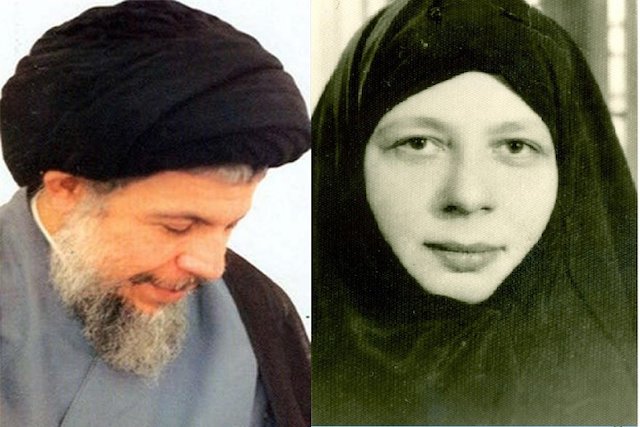April 8th marks the martyrdom anniversary of Martyr Bint al-Huda al-Sadr and Martyr Ayatollah Mouhammad Baqir al-Sadr who were executed by Saddam for their revolutionary activities in 1980. On this occasion Khamenei.ir published parts of Ayatollah Khamenei's remarks on these two noble personalities:
Bint al-Huda Sadr led a feminine movement
If the Islamic society manages to nurture women based on the Islamic model—that is based on the model of Fatima Zahra, Zeinab, and great women, noble ladies, ladies who influenced the world and the history—then women can achieve the true prominent status they deserve. My sisters! My daughters! The ladies of Muslim countries! Know that, any woman at any time, at any place, or any family who receives such an upbringing will gain equal greatness. This was not limited to the early days of Islam; this is possible even during a repressive era or at the time of an infidel's rule. If a family manages to raise their daughter properly, the girl will grow into a great human being. We have had examples in Iran during our time; so had we outside Iran. In our time there was a young, brave, intellectual, artistic lady called Bint al-Huda al-Sadr, Martyr Sadr’s sister, who managed to influence history by playing a role in the oppressed Iraq. Of course she was later martyred. The nobility of a lady like Bint al-Huda Sadr is no less than any of the great and courageous men. Her movement was a feminine movement, while the movement of those noble men was masculine; however, both movements are movements towards perfection: and signify the noble character, and the brilliant jewel of the human essence.
September 25, 1997

Sayyid Muhammad Baqir al-Sadr was a true intellectual column for the Islamic society
I travelled to Iraq in 1957 and visited Sayyid Muhammad Baqir al-Sadr there. He was very young; he was about twenty-five years old. He was already known for his intellectuality. I was younger than him then, about eighteen years old.
During the first days after the revolution when we received the news of Ayatollah Sadr’s martyrdom, we were deeply sorrowed. He was a true intellectual column for the Islamic society. From before the revolution we were familiar with his invaluable works and activities. When the revolution gained victory, he issued powerful messages. There was much hope in him. May God curse Saddam. Thank God that Saddam’s regime was eradicated. We have plenty of noble people, but geniuses are rare. He was one of the rare ones who was truly genius. His mind and thoughts moved beyond what others did. He also raised good students.
Statements made during a meeting with Al-Sadr family; June 08, 2004











Comment